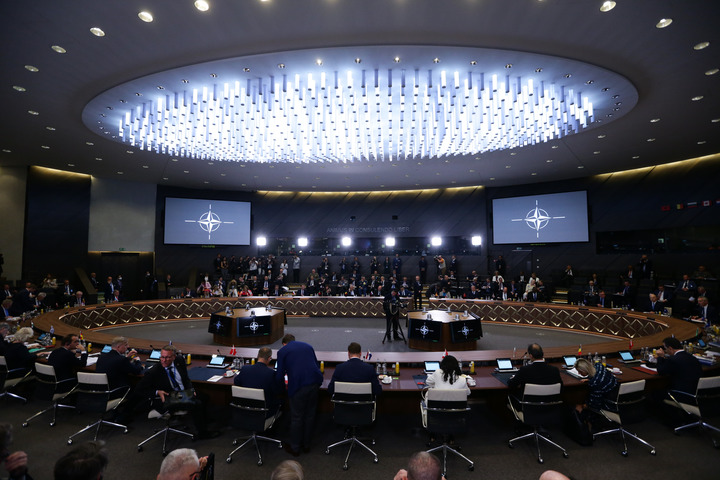Munich, Germany, June 25 (Xinhua) -- On June 25, local time, Munich, Germany, was waiting for a protest against the Group of Seven (G7) summit, which was expected to be attended by tens of thousands of people.
The G7 summit is scheduled to take place on June 26-28 in the small town of Garmisch-Partenkirchen, more than 100 kilometers from Munich, and the NATO summit is scheduled to take place in Madrid, the Spanish capital, from June 28 to 30.
Some analysts have pointed out that the various announced arrangements, including the agenda, have once again fully exposed the Western countries led by the United States in sticking to the Cold War mentality and advocating bloc confrontation. The following three points are particularly noteworthy, showing that there are clear divisions within and with other countries in the West. Please look at the observation sent back by the reporter from the front -
Video loading...
First, I am afraid that it will be difficult to get a response to the attempt to pull people to control Russia.
The crisis in Ukraine is undoubtedly the focus of the two summits. The Western camp invited the leaders of India and other countries to attend the meeting, hoping to persuade them to change their positions and achieve their intention of "isolating Russia", but India and other countries insisted on a neutral position and refused to follow in the footsteps of the West to launch sanctions against Russia.

Participants attend a meeting of defense ministers of NATO member states at their NATO headquarters in Brussels, Belgium, on June 16. Photo by Xinhua News Agency reporter Zheng Huansong
Analysts pointed out that in the context of the current global energy tension and high food prices, developing countries are reluctant to join the Western camp, because these countries are very clear that engaging in camp confrontation will not help solve a series of problems caused by the current situation in Ukraine.
Second, there is a strong opposition to the attempt to expand NATO.
At NATO's upcoming third summit this year, key topics include continuing to provide military aid to Ukraine and deliberating on Finland's swedish accession.
Staff sort out the American flag at the EU headquarters in Brussels, Belgium, on March 24. The three summits of NATO, the Group of Seven and the European Union were held on the same day in Brussels, Belgium. Photo by Xinhua News Agency reporter Zhang Cheng
NATO member Turkey has made it clear that it opposes the "accession" of Finland and Sweden due to its own concerns. There is also a lot of opposition from the people of NATO countries to the continued expansion of NATO.
Fearing too many protests, German police had to dispatch 18,000 police officers to secure the G7 summit and impose a blockade on the venue. There has been an arson incident for the G7 summit in Munich.
In addition, since June 24, a number of protests are planned in Spain, the United States and other countries. Among them, the protesters will hold a "peace summit" in Madrid called "Don't NATO." According to the organizers, a series of activities will be held in many cities around the world and on social media in the next few days to protest the expansion of NATO and continue to promote the escalation of the crisis in Ukraine, and call on Russia and Ukraine to resume negotiations as soon as possible.
Third, the attempt to provoke trouble is alarming and worrying.
The NATO summit also invited Japan, South Korea, Australia and New Zealand to attend. Some analysts believe that this move has the shadow of the US "Indo-Pacific strategy."
U.S. President Joe Biden attends a press conference after a special NATO summit at NATO headquarters in Brussels, Belgium, on March 24. Photo by Xinhua News Agency reporter Zheng Huansong
NATO, which is led by the United States, is a "relic of the Cold War," but in order to prove the necessity of its existence, it constantly advocates group confrontation and provokes conflicts and contradictions. Hidden behind the "Indo-Pacific strategy" is still the hegemonic plot of the United States, which is arousing more and more vigilance and criticism from the international community, especially in the Asia-Pacific region.
Gu Qingyang, an associate professor at the Lee Kuan Yew School of Public Policy at the National University of Singapore, believes that the United States wants to use the panic caused by the situation in Ukraine to plunge the Asia-Pacific region into a geopolitical conflict.
Anna Marinberg-Uyi, a researcher at the BRICS Policy Research Association in the Philippines, said that the United States' constant attempts to create divisions and confrontations in the Asia-Pacific region will only create chaos and instability in the region, increase uncertainty, and will exacerbate the concerns of countries in the Asia-Pacific region. (Reporters: Li Chao, Zhang Zhang, Huang Yan, Ren Ke; Participating reporters: Cai Shuya, Yan Jie, Liu Kai; Editing: Indifferent; Editors: Sun Hao, Wang Shen, Zhu Ruiqing, Yu Rong)
Produced by the International Department of Xinhua News Agency
Produced by Xinhua News Agency's International Communication Integration Platform